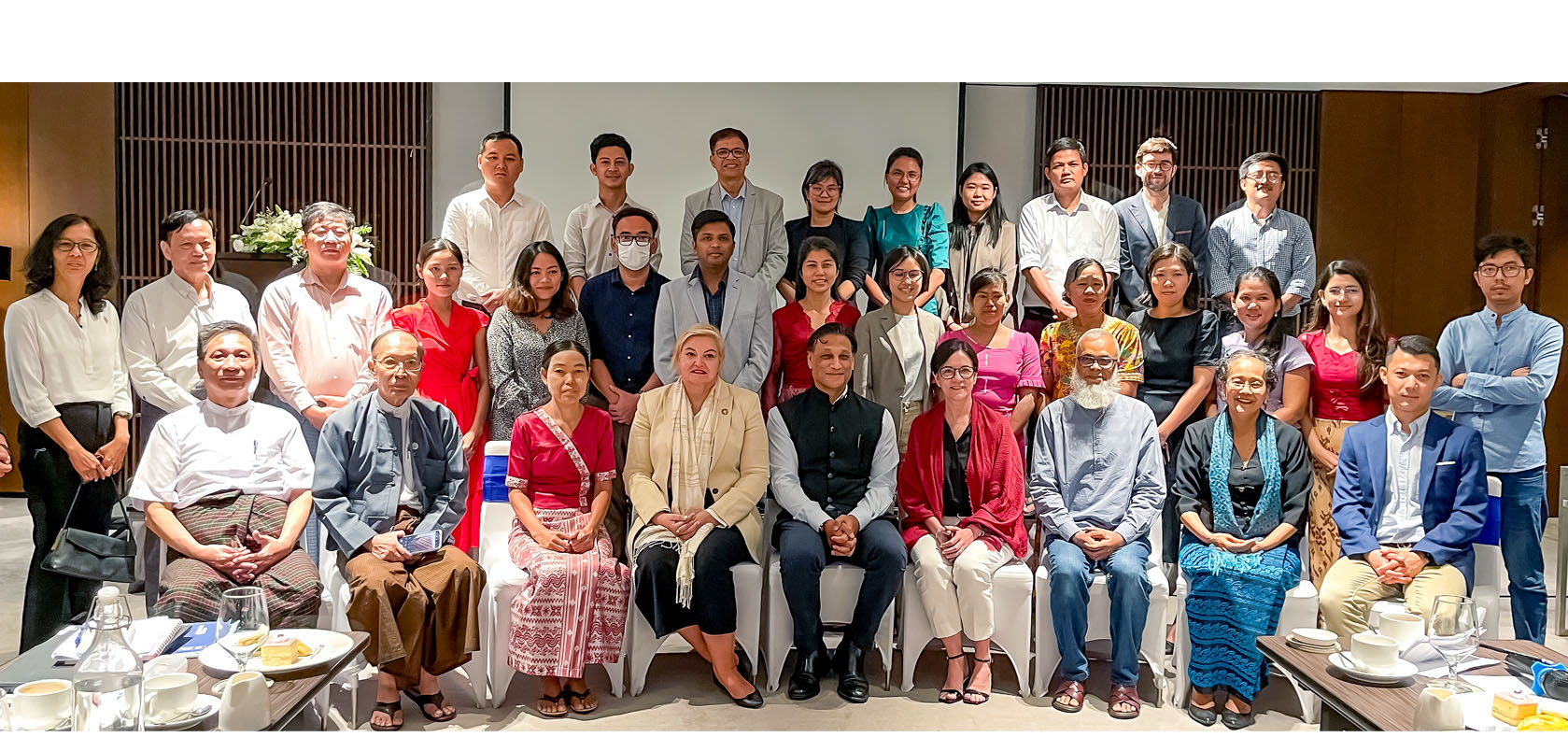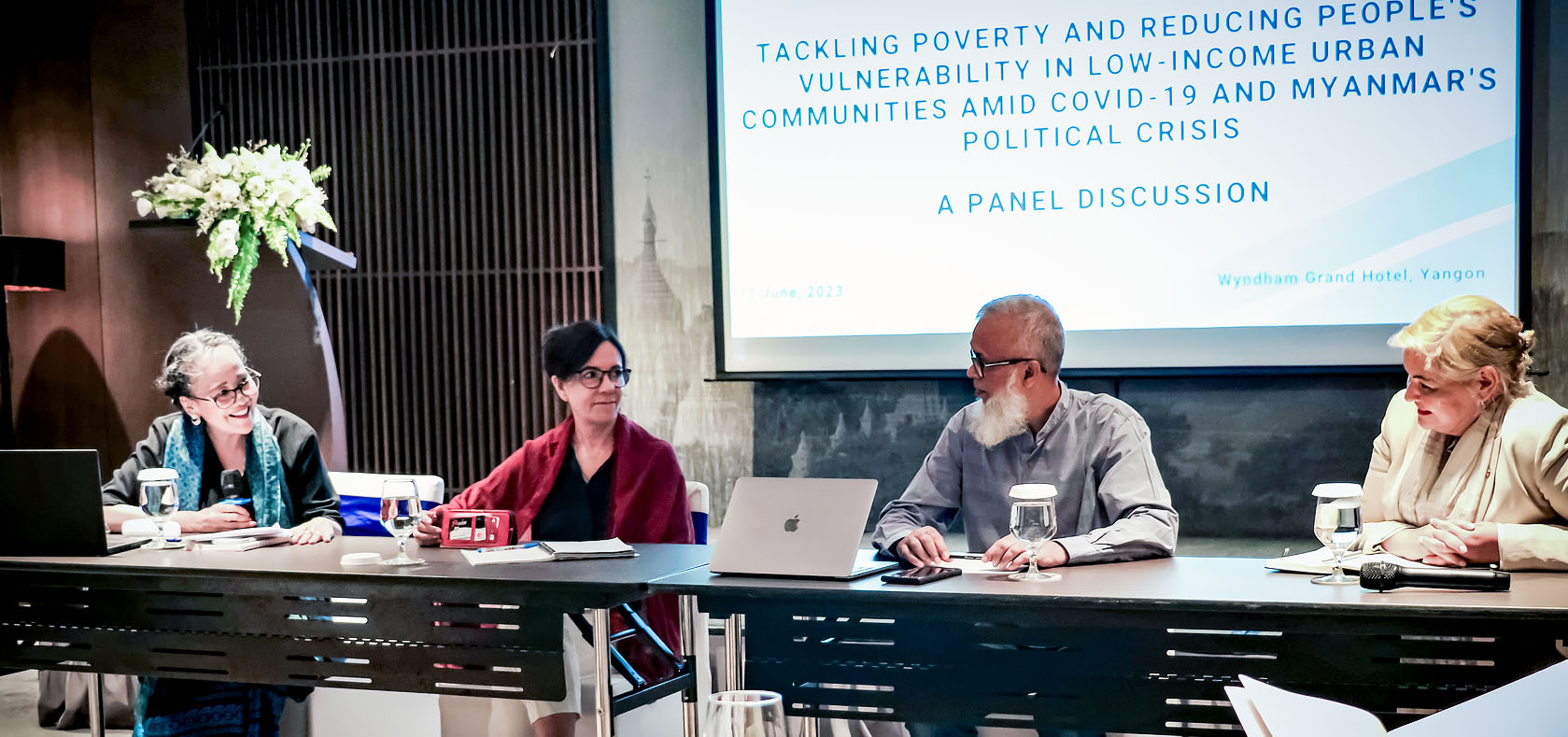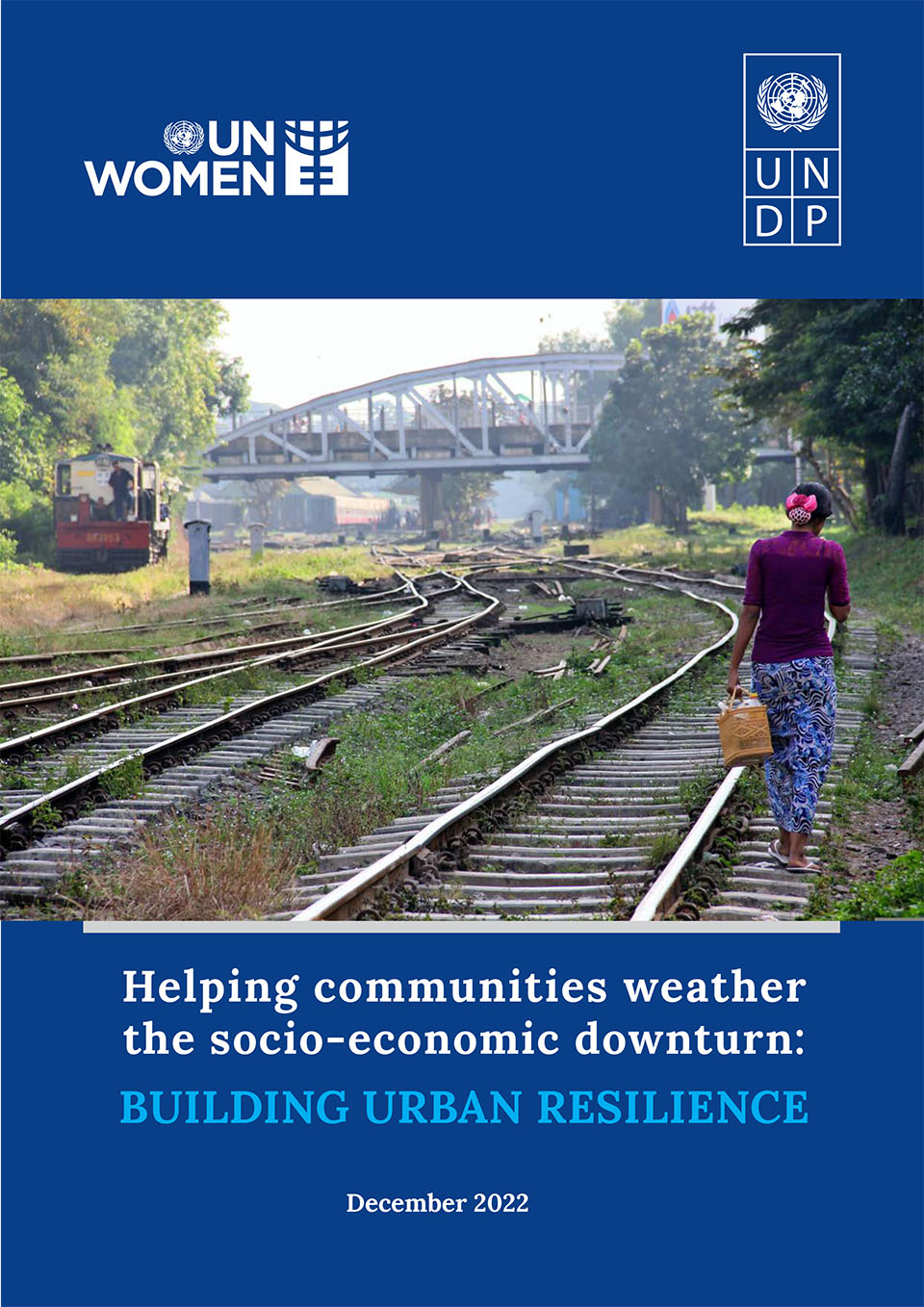Urban poverty in Yangon tackled in new UN project to build community resilience
Date:
[Press release]

Yangon, Myanmar — UNDP, UN Women and UN-Habitat yesterday brought together representatives from local communities, NGOs, development partners and the private sector to discuss research on urban poverty and the innovative strategies being used in a new project building resilience in low-income urban communities.
The event took place in Myanmar’s commercial capital, Yangon, where the compounded crises of the COVID-19 pandemic and the economic and political upheaval resulting from the February 2021 coup have had a devastating impact on Yangon's urban poor.
“When confronted with turmoil across the country, the breakdown in the rule of law, the human rights abuses, the alarming numbers of people displaced by conflict and disasters, it is easy to overlook what is happening right here in Yangon. Life has always been hard for the urban poor, but now it is so much harder. Poor people are much poorer and their numbers have grown significantly,” Titon Mitra, UNDP Myanmar’s Resident Representative, said in his opening remarks.
“If we do not turn our attention to the urban poor and vulnerable, we may enable the conditions for a rapid deepening of intergenerational poverty.”
The Urban Resilience Project (URP) aims to support those made most vulnerable by urban poverty in Yangon, including women and people living in informal settlements. It is a joint project between UNDP, UN Women and UN-Habitat, working in eight townships, five of which are under martial law, identified as the most socially and economically marginalized. It aims to strengthen residents’ resilience by supporting community-led groups to improve basic services and facilities; upgrade the physical environment of informal settlements; address gender-based violence; and promote livelihoods, skills and job creation.
UNDP’s Myanmar Development Observatory presented the findings from the recently published report Helping communities weather the socio-economic downturn: Building urban resilience.
The study shows people living in Yangon’s eight poorest townships earn 30 per cent less than those in the rest of Yangon[1] and that almost a quarter of the residents of these townships had often gone without a cash income in the past 12 months.[2]
Compared to the rest of Yangon, households in the eight URP townships are:
- more likely to live in an informal settlement (14.2 per cent of URP households compared to 1.2 per cent of households in the rest of Yangon);
- more like to have noticed violence against women by family members in their neighbourhood, (14.7 per cent compared to 11.4 per cent);
- less likely to have access to drinkable water in the dry season (88.9 per cent of households compared to 97.3 per cent);
- more likely to be unable to eat nutritious food (27.5 per cent of households compared to 23 per cent); and
- 1.8 times more likely to take their children out of school to earn money.
During the panel discussion, Catarina Camarinhas, Country Programme Manager a.i. of UN-Habitat, highlighted that only 30 per cent of Myanmar’s population resides in urban areas, which presents many opportunities for sustainable urbanization and poverty reduction.
"Building resilience and promoting sustainable urbanization in Myanmar requires comprehensive initiatives and collaboration. By engaging multiple stakeholders and implementing effective local-level strategies, we are working towards sustainable development and climate change adaptation. Together with our partners, we aim to implement gender-responsive climate action in Myanmar,” she said.

Jackie Appel, CEO and founder of the Step-in Step-up Academy, explained how her NGO has been providing vocational training to young people to meet specific job needs in Yangon’s workforce, including in healthcare, office work and hospitality. One young woman explained to the audience at the event how she took part in training to be a cashier and immediately was employed by Yoma Bank after graduating.
Shihab Uddin Ahamad, WaterAid Myanmar’s Country Director, meanwhile discussed how the organization is bringing affordable clean water to low-income areas of Yangon through establishing bottling plants, and helping garment factory workers, who are almost all women, subsidize their incomes through food and hygiene product packages.
Women and girls in Yangon’s urban areas are particularly vulnerable. Over 80 per cent of women in the baseline study said rising food prices and loss of employment or revenues were their major challenges. And in a 2021 UN Women study in Yangon, two out of three women reported being extremely worried about becoming a victim of a violent crime.[3]
“We know 80 per cent of women are working in informal employment in Yangon, that makes them vulnerable to economic downturn and provides hardly any social protection. On top of that, a lack of safe shelter and housing conditions increases the risk of sexual and gender-based violence,” said Karin Fueg, Country Representative a.i. of UN Women.
“Under the URP, UN Women is leading a gender-responsive incubator and business accelerator to help women access business skills and finance, and to address gender norms through life skills, help accessing business networks and referrals to support services like legal aid, psycho-social support or gender-based violence services,” Ms Fueg said.
The Urban Resilience Project’s community-based approach will create opportunities for resilience building, economic growth, poverty reduction, and sustainable development. By addressing the needs of the most vulnerable and fostering a sense of ownership, the programme lays a foundation for long-term success and positive change.

Find out more:
- Read the report: Helping communities weather the socio-economic downturn: Building Urban Resilience
- Explore the Myanmar Development Observatory: Collecting, analyzing and disseminating data. MYANMAR DEVELOPMENT OBSERVATORY
About the Urban Resilience Project
The Urban Resilience Project aims to address urban poverty in eight of Yangon’s poorest peri-urban townships. It focuses on providing access to sustainable sources of safe drinking water, improving health and sanitation services, supporting climate-resilient basic urban infrastructure, including drainage and access roads, and supporting micro and small enterprise development and work opportunities to more than 450,000 people.
UN Women
UN Women is the United Nations entity dedicated to gender equality and the empowerment of women. A global champion for women and girls, UN Women was established to accelerate progress on meeting their needs worldwide.
UNDP
UNDP works in 170 countries and territories to eradicate poverty and reduce inequality. It helps countries to develop policies, leadership skills, partnering abilities, institutional capabilities, and to build resilience to achieve the Sustainable Development Goals. Its work is concentrated in three focus areas; sustainable development, democratic governance and peacebuilding, and climate and disaster resilience.
UN-Habitat
The United Nations Human Settlements Programme, UN-Habitat, is the agency of the United Nations dedicated to promoting socially and environmentally sustainable development of human settlements in an urbanizing world, with the goal of providing safer and inclusive human settlements.
For information:
UN Women
- Website: www.http://myanmar.unwomen.org
- Twitter: @unwomenmyanmar
- Contact: [ Click to reveal ]
UNDP
- Website: https://www.undp.org/myanmar
- Twitter: https://twitter.com/UNDP_Myanmar
- Facebook: https://www.facebook.com/UndpMyanmar/
- LinkedIn: https://www.linkedin.com/company/undp-myanmar
- Contact: [ Click to reveal ] +959959481869
UN-Habitat
- Website: www.unhabitat.org.mm
- Facebook: https://www.facebook.com/UNHMyan
- LinkedIn: https://www.linkedin.com/company/un-habitat-myanmar/
- Twitter: https://twitter.com/UNHABITAT_MM
- Media Contact: Naw Khine Thazin (Gloria), E-mail: [ Click to reveal ] Phone: +959966707435
[1] The survey found people in the URP townships earn an average income of 369,000 kyat per month compared to 499,000 kyat in the rest of Yangon.
[2] 24.1 per cent compared to 16.8 per cent in the rest of Yangon.
[3] UN Women, 2021 (unpublished). Gender Sensitive Resilience Index For Yangon, Myanmar: Understanding Resilience Capacity Of Women In Myanmar Amidst Covid, Coup And Chaos.